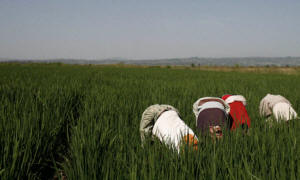 |
|
|
|
| DEPARTMENTS | |||
|
|
|||
|
|
|||
|
|
|||
|
|
|||
|
|
|||
|
|
|||
|
|
|||
| YOU CAN!... | |||
|
|
|||
|
|
|||
|
MORE ABOUT HUNGER NOTES |
|||
|
|
|||
|
|
|||
|
|
|||
|
|
|||
|
|
|||
|
|
Harmful economic systems: Obtaining income
The basic idea and activity in productive societies is helping to produce goods— things that are useful to someone— food, light bulbs, cars— and then exchanging the income received for goods that are desirable to you. This fundamental economic mechanism exists in “harmful” economic societies as well. Unfortunately, also existing, and why we describe these societies as harmful, a certain strata— usually the top— also exists to obtain goods through means which may be described as unproductive or extractive.
The principal ways in which income is obtained in a harmful economic system are twofold: 1) obtain it through the government, or 2) use the government to maintain, consolidate and increase sources of income that are (apparently) obtained in other ways. The first is most typical or at least most evident in developing countries.
Armed conflict--typically the fight by groups for control of the government or territory (frequently; possessing natural resources), deserves a separate discussion, because it has been throughout history the principal way in which harmful economic societies have been established and because of its importance in the world today.
North Korea is a "poster country" for a harmful economic system enabling an elite to live well while the majority live in abject poverty. North Korea’s capital, with its water parks and new buildings, coddles the elite Anna Fifeld Washington Post September 2, 2014 Here's how lousy life is in North Korea Rick Newman US News and World Report April 12, 2012
Obtaining income through the government There are a wide variety of means in which government officials and others obtain revenue from the government. The first thing to recognize is that people at the top of government, or those who have significant control over the government but who are not government officials--often entrepreneurs or corporations) can and do plunder resources coming into the government. Government revenue is often not devoted to productive services but siphoned off by those in control of the government. A nation expects that its national resources will be used for the benefit of the nation. However very large amounts of such revenue are often used to enrich those in charge of the government. People at lower levels of government can plunder resources too, by not providing services which they are paid to provide, by charging for services which they should provide, or by taking goods, such as medical supplies or automobiles/trucks, which should be used for government service.
Corruption. One name for a particular type of the unproductive allocation of resources is corruption. Corruption can occur in various ways.
Government officials can get extra-official payments (frequently very large but also often very small) for carrying out, or not carrying out duties that they are paid for and obliged to perform as their duties as government officials.
What to do about "grand corruption? An estimated $17.6 trillion in murky money is held in tax havens, unidentified bank accounts or shell companies around the world — some of it acquired illegally through corruption, crime or tax evasion. Celestine Bohlen New York Times February 23, 2015

Former movie star Jayalalitha Jayaram, pictured in graffiti, was convicted on corruption charges and forced to step down. She continues to run the government even though she has not left her house since she was released on bail in October. Photo: Annie Gowen/The Washington Post
Ex movie star and convicted politician still running her Indian state Annie Gowen Washington Post February 16, 2015 See HN special report Harmful economic systems: Obtaining income
When US targets foreign leaders for corruption, recovering loot Is a challenge. Deal with Equatorial Guinea’s Teodoro Nguema Obiang Mangue for mansion, Michael Jackson statues gets government less than half of what it sought. James V. Grimaldi Wall Street Journal October 10, 2014
Mubarak gets three years for embezzlement, and his sons get 4 David D Kirkpatrick New York Times May 21, 2013
Nigerians ask why oil funds are missing Adam Nossiter New York Times March 10, 2014 Governor of Nigeria's central bank is fired after warning of billions in missing oil revenue Adam Nossiter New York Times February 20, 2014
West African livilihoods weakened by graft IRIN News January 3, 2013 See HN special report: Harmful economic systems: obtaining income
Letter from Africa: The looting of Nigeria's pension funds BBC News June 28, 2013
China's prostitutes routinely extorted, abused by police, report says William Wan Washington Post May 13, 2013
Corruption feeds on Zimbabwe's poor IRIN News February 1, 2013
Pay for little or no work/inefficient delivery of services. Another concern is that government officials receive pay without delivering (often anything near) an adequate level of services. What they have done is support the current political system, not deliver government services.

Above a busy intersection in Mexico City, a billboard tallies Mexican education funds wasted since the first day of school last month. According to this new “abuse meter” about $2.8 billion annually goes into the pockets of 298,174 no-show teachers and administrators who collect pay without working. Photo: Adriana Zehbrauskas/New York Times
Billboard drives home extent of corruption as Mexican schools suffer Damien Cave New York Times September 1, 2014
Allocation of resources. The government frequently allocates resources, such as land and other natural resources such as oil, and and business opportunities, directly to itself and its supporters.
A very large part of this allocation/corruption is diversion of revenues from goods exported from or imported to the country.
The big ticket item is natural resource exports, including oil. One would think that discovering oil and being able to export it would enable governments in developing countries to provide sufficient resources for assisting poor people in that country to have education and health services and to provide productive employment. NOT! In fact what HN has described as harmful economic systems mean that very little---a token amount-- gets to poor people. (See resource curse Wikipedia especially the corruption section for further information.)
An excellent annual report on this issue is The Resource Governance Index, Access the 2013 report.
The Index measures the transparency and accountability in the oil, gas and mining sector of 58 countries worldwide and finds that the vast majority surveyed fail to meet satisfactory standards in how their natural resources are governed. In these countries, opacity, corruption and weak processes keep citizens from fully benefiting from their countries’ resource wealth. In 47 of the 58 Index countries, governments have yet to embrace openness and accountability. Together these 58 nations produce 85 percent of the world’s oil, 90 percent of diamonds and 80 percent of copper, generating trillions of dollars annually. Revenue Watch Institute
Inflation and currency devaluation Though neither inflation nor currency devaluation are necessary a sign of the government obtaining resources to promote its own interests, both can be. Large deficits (governments spending much more money than they take in typically lead to both inflation and devaluation, and is frequently due to government desire to control resources.
Use the government to maintain, consolidate and increase sources of income that are (apparently) obtained in other ways. This is more difficult to understand. Slavery would be an important and relatively clear example. The slave-owner is able to obtain an increased income from his slave's labor. This income is not income from the government. Nonetheless, a government--the United States before the Civil War, for example--is necessary to maintain a legal, administrative and police/military structure to permit and enforce slavery. A recent major issues is developing country governments letting outside investors purchase or lease large tracts of land, much of it belonging to local people.
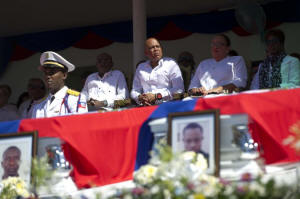
THE CENTER OF POWER President Michel Martelly of Haiti, center, seated between Prime Minister Evans Paul, whose predecessor was ousted in December, and Sophia Martelly, the first lady, who has been targeted in a corruption complaint. Photo: Hector Retamal/Agence France-Presse — Getty Images
Haitian leader's power grows as scandals swirl Frances Robles New York Times March 16, 2015 See HN special report: Harmful economic systems
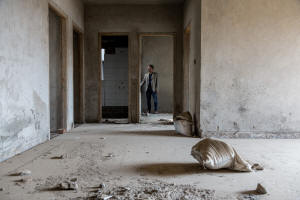
Neeraj Jagga bought this apartment in a 4,000-unit complex near New Delhi but said construction had barely progressed in three years. The developer, Kabul Chawla, has been the subject of numerous consumer complaints. Photo: Graham Crouch/ New York Times
Amid complaints in India, a real estate deal in Manhattan Stephanie Stall and Louise Story New York Times February 9, 2015 See more in this series Towers of secrecy: Streams of wealth flow to elite New York real estate
Africa losing billions from fraud and tax avoidance. First African initiative to address illicit outflows says governments, multinationals and crime deprive poor countries of crucial services. Mark Anderson The Guardian February 2, 2015
Developing countries lose an estimated $990 billion dollars annually in illicit financial flows General Board of Church and Society of the United Methodist Church January 30, 2015 Access full report
The Dominion Farms’ land grab in Nigeria Global Justice Now January 2015 See full report (8 page PDF) See HN special repport: Trade and Hunger
Richest 1 percent will own more than rest combined by 2016, Oxfam report says Al Jazeera America January 19, 2015 Access full report See HN special report Harmful economic systems: Obtaining income

Peruvian National Police burn an illegal gold mining camp in the Madre de Dios region of the Peruvian Amazon. After years of turning a blind eye to nearly 40,000 illegal miners in the Madre de Dios region, officials are moving to halt environmental damage. Photo: Dominic Bracco II/Prime for The Washington Post
South American commodity boom drives deforestation and land conflicts Nick Miroff Washington Post January 1, 2015 See HN special report Hunger, the environment and climate change

Using hand tools and draft animals, a family harvests wheat in Ethiopia’s famine-prone highlands. Education has helped small farmers become more efficient, but wheat yields are still a third below the world’s average. With more than a third of Ethiopians malnourished, the government is courting industrial farms to help close the gap. Photo: Robin Hammond/National Geographic
Africa: The next breadbasket? Joel K Bourne, Jr National Geographic June 2014

In this photograph taken on September 16, 2013, an alleged Indian human-trafficking victim sits at a police station after being rescued from a village in Karnal around 100 kms from New Delhi. In India, mostly women are trafficked or tricked into different forms of slavery ranging from domestic service to prostitution. Desperately poor parents also sell their children who are then forced into begging rackets and manual labor. Photo: Manan Vatsayana/Getty Image
Slavery is still thriving and is more profitable than big oil Karina Kolodny Huffington Post May 22, 2014

"Land grabs" in Laos are driving poor farmers, including ethnic minorities, off their land, away from livelihoods they know and into further poverty, activists and experts say. Photo: Martin Abbiati/IRIN

Congo’s plan to lease land to investors was developed after an earlier initiative to support small-scale farmers failed. A government project to provide seeds and equipment such as new hoes and machetes wasn’t sustainable because it depended on limited public funds. The farmers also didn’t have the capacity to store and process their produce, or transport it to market. Photo: Agence France-Presse/Getty Images
Congo seeks investors for farmland bigger than France Simon Clark Wall Street Journal October 28, 2014
Read it and weep: The Congo is leasing 25 percent of its land to investors from other countries Lane Vanderslice Hunger Notes November 30, 2014

"Land grabs" in Laos are driving poor farmers, including ethnic minorities, off their land, away from livelihoods they know and into further poverty, activists and experts say. Photo: Martin Abbiati/IRIN
Laos “land grabs” drive subsistence farmers into deeper poverty Dana MacLean IRIN News May 22, 2014 See Hunger Notes special report: Harmful economic systems: obtaining income
The Case for Reparations. Two hundred fifty years of slavery. Ninety years of Jim Crow. Sixty years of separate but equal. Thirty-five years of racist housing policy. Until we reckon with our compounding moral debts, America will never be whole. Ta-Nehisi Coates The Atlantic May 21, 2014
Oil money, and where it flows: The movie ‘Big Men’ looks at Ghanaian oil discovery Jeannette Catsoulis New York Times March 13, 2014
Egypt's military expands its power over the economy Abigail Hauslohner Washington Post March 16, 2014
Kofi Annan: Africa plundered by secret mining deals BBC News May 10, 2013 See Africa Progress Report 2013
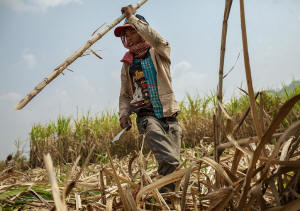
Activists have called for the exclusion of Cambodian sugar from duty-free treatment in Europe, saying that it triggers corporate land grabs. Above, a worker harvesting sugar at a Phnom Penh Sugar plantation. Photo: Thomas Cristofoletti/New York Times
Sugar industry highlights conflicts over trade policy and land Keith Bradsher New York Times September 30, 2013 Consider supporting the Oakland Institute's work in combating forced evictions and corporate land grabs in developing countries.
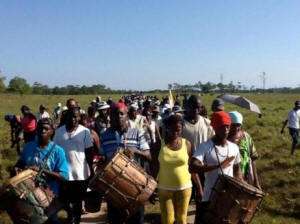
A Garífuna ceremony on lands stolen by organized crime networks in Honduras. Photo: OFRANEH.
We don't have life without land: Holding ground in Honduras Tory Field and Beverly Bell Co-author Lauren Elliot Other Worlds August 11, 2013 Without our land we cease to be a people: Defending indigenous territory and resources in Honduras Tory Field and Beverly Bell Other Worlds August 18, 2013 They fear us because we are fearless: Reclaiming indigenous lands and strength in Honduras Tory Field and Beverly Bell Other Worlds August 27, 2013
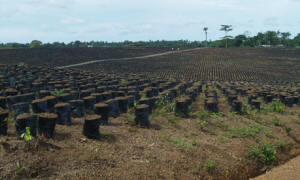
The Socfin palm oil nursery near Sahn Malen, Sierra Leone. A Christian Aid report has criticised land deals in Sierra Leone for not benefiting locals. Photo: Christian Aid
Sierra Leone's smallholder farmers 'worse off' after large land deals. Push to lure foreign investors has led to a rise in social problems, sparking fears of a return to conflict, NGO warns Mark Tran
Guardian July 26, 2013
More on land deals in
developing countries from
The Guardian and the
Oakland Institute.
Telecom scandal erupts in India: corruption
and 'crony capitalism' appear to have cost the Indian government as much as US$40 billion in lost
cell phone spectrum rights Jim Yardley and Heather Timmons New York Times December
13,
2010 Land ownership would be another
key example. In many countries there is highly unequal distribution of land.
This ownership is typically derived from a period of conquest where land
ownership was based on military force or other aspects of power. Land ownership,
in spite of the passage of many years, has continued in a highly unequal
fashion, essentially due to the continuance of highly unequal access to sources
of power and wealth.
A Tsimané family in front of their home in El Jatatal. Photo: Rafael Acuña/IPS
Bolivan ranchers try to drive Tsimané Indians
off their land Rafael Acuña
Coaquira Inter Press Service
April 20, 2013
Clashes over land seizures batter the police in
Myanmar Thomas Fuller New
York Times February 28, 2013 See Hunger Notes
special report on
trade and hunger
Farm workers remove weeds from young plants at the
palm oil plantation owned by Karuturi Global, near
the town of Bako, in Ethiopia. Photograph: Jose
Cendon/Getty Images
Indian investors are forcing Ethiopians off their land. Thousands of Ethiopians are being relocated or have already fled as their land is sold off to foreign investors without their consent. John Vidal
The Guardian February 6, 2013
See
report
Biofuel production pushes farming communities off land - report
Chelsea Diana AlertNet
February 28, 2013
Clearing a rainforest
in Cameroon for palm oil plantation. Opponents say the costs outweigh benefits.
Photo: Courtesy David Hoyle/WWF
Cameroon: Campaigners oppose industrial palm oil plantations
IRIN News December 14,
2012
Curbing Tanzania's land-grabbing race
Orton Kiishweko Inter Press Service December 19, 2012
See Hunger Notes special report
Trade and Hunger
Forms of slavery--now without a
strong basis in law--have continued to this day. In the present, a key term is "forced
labor." An invaluable International Labor Organization report,
Forced Labor describes the various types of forced labor.
More
than 12 million are trapped in forced labor worldwide.
) Certainly other aspects of society such as religion,
prejudice, or 'scientific thinking' can reinforce the governmental role.
For example, the Indian caste system is a system of stratification of human beings,
with the Dalits or untouchables being the lowest caste, and this system has a
strong religious component, as well as also being sustained by the people that
benefit from the system (Wikipedia
Dalit,
Caste
system in India).
Noura Mint Mourada, now 18, became a slave to a family in Boutilimit, Mauritania, at the age of 4.
Photo: Samuel Aranda/ New York Times
Mauritania confronts a long legacy of slavery
Adam Nossiter New York Times November 11, 2013
The fight against modern-day slavery
(opinion)
Nisha Varia
Foreign
Policy In Focus November 6, 2013
A young boy works as a laborer near Kathmandu.
Photo: David Longstreath/IRIN
Centuries after slavery was outlawed, 29.8 million people globally continue to be subjected to new and diverse forms of servitude, new index shows
IRIN News October 18, 2013
See full
report. See the section of Hunger
Notes special report on Harmful economic systems on
Impact on poor people All harmful economic activity is not managed by the
government or by groups that control or enjoy benefits from the government. There
are also other groups that undertake harmful economic activity. This can result
in conflict between these groups, typically with great harm to ordinary people
living in the conflict zones. Examples would be Sudan, Somalia, the
Democratic Republic of the Congo, and the states in Mexico that are contested
between the Mexican government and drug organizatins. Drug cartels are a very important subset of "private
enterprise" harmful economic activity where activities such as bribery, intimidation and murder are frequently employed.
Mexico targets gang that infiltrated the mining industry
Paulina Villegas New York Times March 5, 2014
Armed conflict.
Armed groups can fight with the government for control of territory, such as in
Colombia, Pakistan, or the Democratic Republic of the Congo. Other countries can
also be involved as in the Congo.
At
least 6.8 million people were displaced last year, mainly by long-running
conflicts, pushing the number of those forced to live away from home to 27
million - the highest since the mid-1990s
IRIN News May 28, 2010 Even a government that to some degree supports ordinary
citizens and their rights can be outmaneuvered by others, such as powerful
government officials and landlords and others with economic power.
Or governments can simply look the other way and
acquiesce to wrongdoing.
A high level of "private enterprise" violence can lead to the desire for a more authoritarian government, a government that may restrict personal freedom, but also provides a more orderly society.
Harmful Economic Systems main page
2014 Harmful Economic
Systems: Obtaining Income
